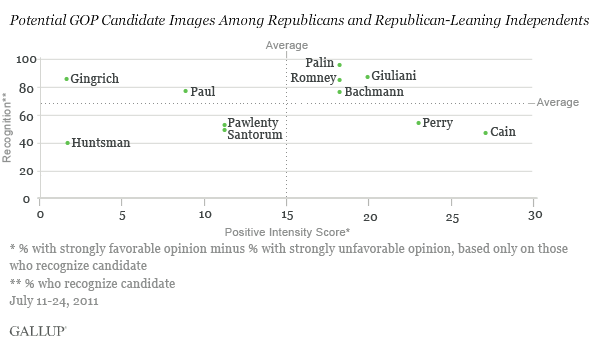PRINCETON, NJ -- Herman Cain and Rick Perry have the highest Positive Intensity Scores among Republicans who know them. Rudy Giuliani, Michele Bachmann, Sarah Palin, and Mitt Romney trail slightly behind. There are no signs of improvement in the weaker Positive Intensity Scores of Tim Pawlenty, Rick Santorum, Ron Paul, Newt Gingrich, or Jon Huntsman.

Perry, Giuliani, and Palin -- three of the six GOP contenders generating the highest enthusiasm among Republicans nationwide -- have not yet announced whether they are going to run for their party's nomination. Recent news reports have focused most intensely on the possibility that 10-year Texas Gov. Perry will jump into the race. If he does, one of his first challenges will be to increase his name recognition; his 56% recognition score is well below the recognition of many GOP candidates or potential candidates. On the other hand, Perry generates strong enthusiasm from Republicans who know him. His Positive Intensity Score is up to 23 for July 11-24, second only to that of the slightly less well-known Georgia businessman -- and announced candidate -- Cain.
Giuliani and Palin are the other two unannounced candidates who generate significant enthusiasm among Republicans, and, unlike Perry, both are well-known. As has been the case all year, Palin generates strong reactions on the positive and the negative side of the ledger. Twenty-six percent of Republicans have a strongly favorable opinion of the former Alaska governor, the same as for Perry and higher than Giuliani's 22%. Palin, however, also has an 8% strongly unfavorable rating (vs. 3% each for Perry and Giuliani), which pulls down her overall Positive Intensity Score.
Twenty-one percent of Republicans have a strongly favorable opinion of former Massachusetts Gov. Romney, while 3% have a strongly unfavorable opinion. He is recognized by 85% of Republicans. Bachmann's recognition score is now 78%, up 26 percentage points from early March. Bachmann's Positive Intensity Score of 18 is identical to Romney's, based on the 23% of Republicans who give her a strongly favorable rating and the 5% whose opinion is strongly unfavorable.
The other five candidates Gallup is measuring have varying degrees of recognition among Republicans, but none are yet showing signs of generating strongly positive opinions among them. Gingrich and Paul are the best known among this group, followed by Pawlenty, Santorum, and Huntsman. Gingrich and Huntsman continue to have the lowest Positive Intensity Scores of any candidate or potential candidate tested.
Implications
The campaign for the GOP presidential nomination remains unsettled as several high-profile Republicans ponder whether to jump into the race. The July 11-24 Gallup tracking data make it clear that potential candidates Perry, Giuliani, and Palin would have an immediate impact on the race if they were to enter it. Perry is the least well-known nationally of these three, but generates the strongest positive intensity from those who do know him. Giuliani and Palin are much better known, and have above-average Positive Intensity Scores.
Among announced candidates, Cain has the strongest Positive Intensity Score, although his recognition among Republicans nationwide has yet to break the 50% barrier. Bachmann is now almost as well-known as Romney, and this week they share a Positive Intensity Score of 18.
The data continue to provide sobering news for Paul, Pawlenty, Santorum, Gingrich, and Huntsman. None of these announced candidates have been able to move the needle on their below-average Positive Intensity Scores in recent weeks. Additionally, Pawlenty's, Santorum's, and Huntsman's name recognition has been static, with no new signs that their campaign efforts are attracting the attention of rank-and-file Republicans nationwide.
Survey Methods
Results are based on telephone interviews conducted as part of Gallup Daily tracking July 11- 24, 2011, with random samples of Republicans and Republican-leaning independents, aged 18 and older, living in all 50 U.S. states and the District of Columbia. Questions asking about the 11 potential candidates measured in this research were rotated among randomly selected samples of Republicans each night; over the 14-day period, each candidate was rated by a minimum of 1,500 Republicans and Republican-leaning independents.
For the overall ratings of each potential candidate among Republicans and Republican-leaning independents, including recognition scores, one can say with 95% confidence that the maximum margin of sampling error is ±3 percentage points. For the Positive Intensity Score for each candidate, the maximum margin of sampling error varies depending on the size of the group recognizing the candidate.
Interviews are conducted with respondents on landline telephones and cellular phones, with interviews conducted in Spanish for respondents who are primarily Spanish-speaking. Each sample includes a minimum quota of 400 cell phone respondents and 600 landline respondents per 1,000 national adults, with additional minimum quotas among landline respondents for gender within region. Landline telephone numbers are chosen at random among listed telephone numbers. Cell phone numbers are selected using random-digit-dial methods. Landline respondents are chosen at random within each household on the basis of which member had the most recent birthday.
Samples are weighted by gender, age, race, Hispanic ethnicity, education, region, adults in the household, and phone status (cell phone only/landline only/both, cell phone mostly, and having an unlisted landline number). Demographic weighting targets are based on the March 2010 Current Population Survey figures for the aged 18 and older non-institutionalized population living in U.S. telephone households. All reported margins of sampling error include the computed design effects for weighting and sample design.
In addition to sampling error, question wording and practical difficulties in conducting surveys can introduce error or bias into the findings of public opinion polls.
For more details on Gallup's polling methodology, visit www.gallup.com.
